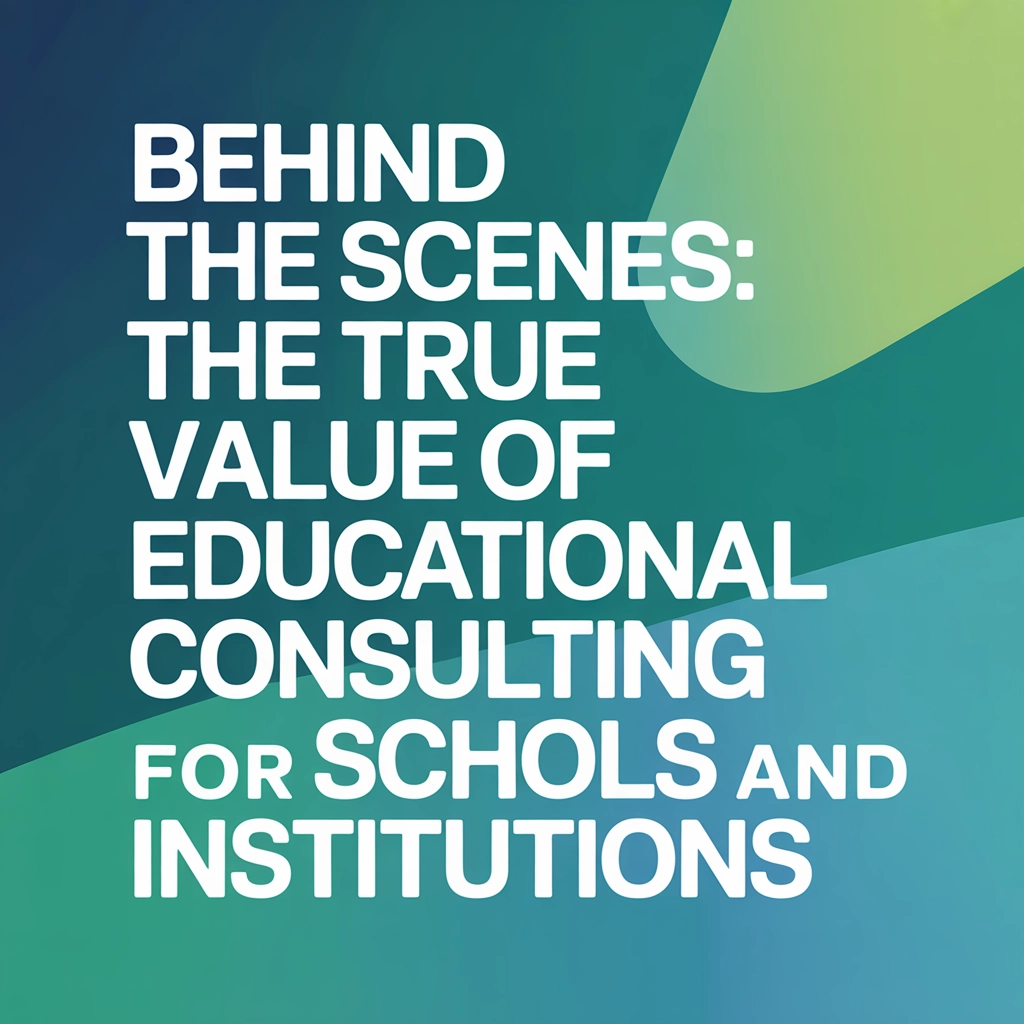The Real Impact of Educational Consulting: What Institutions Need to Know
Jun 12, 2025 2:54 pm
Behind the Scenes: The True Value of Educational Consulting for Schools and Institutions

In the constantly evolving landscape of education, schools and institutions face mounting pressure to deliver exceptional results while navigating limited resources, shifting demographics, and technological disruption. This is where educational consulting offers transformative value—though much of this work happens behind the scenes, invisible to casual observers.
As someone who has spent decades in this field, I've witnessed firsthand how the right consulting partnership can revitalize struggling programs, elevate good schools to greatness, and create lasting institutional change. But what exactly makes educational consulting worth the investment? Let's pull back the curtain on this often misunderstood profession.
Beyond Surface-Level Solutions
Educational consulting is frequently mischaracterized as simply bringing in outside "experts" to tell educators what they're doing wrong. Nothing could be further from the truth. Effective consulting is a collaborative process built on mutual respect and shared expertise.
The real value lies not in prescribing one-size-fits-all solutions but in the consultant's ability to:
- Observe systems with fresh eyes unclouded by institutional history
- Ask probing questions that internal stakeholders might avoid
- Connect isolated departments and bridge communication gaps
- Provide evidence-based frameworks tailored to specific contexts
- Facilitate difficult conversations with neutral third-party perspective
As one principal from a partner school recently told me, "We didn't need someone to tell us what to do—we needed someone to help us see what we already knew but couldn't articulate."
The Tangible Impact on Student Success
While educational consulting directly serves administrators and faculty, the ultimate beneficiaries are always students. Research consistently demonstrates that schools utilizing educational consultants see measurable improvements in student outcomes.
According to recent studies, schools partnering with educational consultants have experienced:
- 15% higher improvement in standardized test scores compared to national averages
- Significant increases in student engagement metrics
- Higher homework completion rates
- More positive attitudes toward learning
- Improved classroom behavior and attendance

One particularly striking example comes from a midwestern school district that implemented a consultant-led literacy initiative. Within just nine months, they documented a 20% improvement in literacy rates alongside dramatic increases in student engagement with reading materials.
These results aren't magical—they stem from systematic improvements in teaching methods, curriculum alignment, and institutional culture that effective consultants help catalyze.
The Four Pillars of Educational Consulting Value
1. Strategic Vision and Alignment
Many educational institutions operate with disconnected initiatives pulled in different directions by various stakeholders. A consultant's first task is often helping establish or clarify a unified vision.
This process typically involves:
- Facilitating inclusive conversations with all stakeholders
- Analyzing institutional data to identify strengths and opportunities
- Benchmarking against comparable successful institutions
- Developing consensus around priorities and direction
- Creating actionable roadmaps with clear milestones
At RU Insititute, we've developed proprietary frameworks for institutional alignment that have helped dozens of schools transform scattered efforts into coherent strategies. The result? Resources flow more efficiently, stakeholders pull in the same direction, and progress becomes measurable.
2. Curriculum Development and Refinement
The curriculum is the beating heart of any educational institution, yet it's often where the greatest disconnect exists between intention and reality.
Effective educational consultants bring specialized expertise in:
- Auditing existing curriculum for gaps, redundancies, and misalignments
- Integrating current research on learning and pedagogy
- Ensuring vertical and horizontal alignment across grade levels and subjects
- Developing assessments that authentically measure learning goals
- Balancing rigor with accessibility for diverse learners

One independent school I worked with discovered through our curriculum mapping process that their much-touted "writing across the curriculum" initiative existed mostly on paper. While the school believed writing was being taught in every subject, our systematic analysis revealed massive inconsistencies in quality, frequency, and assessment. After implementing our recommended changes, student writing samples showed remarkable improvement within a single academic year.
3. Professional Development and Faculty Growth
Perhaps the most significant yet undervalued contribution educational consultants make is transforming how teachers teach. While one-off professional development sessions rarely change practice, sustained consulting relationships can revolutionize classroom instruction.
The most effective approaches include:
- Job-embedded coaching with real-time feedback
- Model teaching demonstrations
- Collaborative planning sessions
- Video analysis of teaching practice
- Data-driven instructional adjustments
These approaches work because they respect teachers as professionals while providing the structured support necessary for growth. As one teacher told me after a year-long consulting engagement, "For the first time in my career, I feel like I'm truly growing as an educator rather than just adding more tasks to my plate."
4. Organizational Effectiveness and Culture
Even the best curriculum and teaching can't overcome dysfunctional organizational systems. Educational consultants bring objective perspective to sensitive issues like:
- Leadership team dynamics and decision-making processes
- Communication systems and information flow
- Resource allocation and budgeting priorities
- Faculty evaluation and growth systems
- School culture and community engagement
By addressing these foundational elements, consultants help create the conditions where educational excellence can flourish. One struggling charter school network I worked with discovered that their academic challenges stemmed primarily from leadership team misalignment and poor communication systems—issues invisible to those embedded in the day-to-day operations but immediately apparent to an experienced consultant.
Maximizing the Consultant Relationship
For schools considering educational consulting services, here are key principles for maximizing return on investment:
- Seek clarity on goals before engagement begins. The more specific you can be about what success looks like, the more effectively a consultant can help you achieve it.
- Involve key stakeholders from the beginning. Resistance often comes from those who feel excluded from the process.
- Be transparent about challenges and constraints. Consultants can work around limitations, but only if they know they exist.
- Commit to implementation support. The best recommendations mean nothing without systematic follow-through.
- Establish clear metrics for success. What will you measure to determine if the consulting engagement is working?

The Hidden ROI of Educational Consulting
While improved test scores and student outcomes provide quantifiable metrics for consulting success, many of the most valuable benefits are harder to measure but no less significant:
- Increased faculty satisfaction and retention: Teachers who receive meaningful support and professional growth opportunities are more likely to stay.
- Enhanced institutional reputation: As word spreads about improvements, enrollment and community support often follow.
- Stronger leadership capacity: Administrators who work with skilled consultants develop skills that continue paying dividends long after the engagement ends.
- Cultural transformation: The most profound consulting impact often comes in shifting how an institution approaches problems and embraces change.
- Long-term sustainability: Rather than quick fixes, quality consulting builds systems that sustain improvement over time.
Making the Right Match
Not all educational consultants are created equal. The field encompasses everything from solo practitioners to global firms, generalists to narrow specialists. Finding the right match for your institution's specific needs is crucial.
At RU Insititute, we believe in beginning every potential engagement with a thorough discovery process to ensure alignment between your needs and our expertise. Whether you're facing challenges with curriculum development, strategic planning, leadership coaching, or comprehensive school improvement, the consulting relationship should begin with careful consideration of fit.
The Consultant as Catalyst
In my decades working with corporate clients and educational institutions, I've come to see the consultant's role not as the hero of the story but as the catalyst that activates the potential already present within the organization. The most successful consulting engagements don't create dependency but build capacity—leaving behind not just recommendations but transformed capabilities.
The true value of educational consulting lies not in providing answers but in helping institutions ask better questions, see beyond immediate challenges, and build sustainable systems for ongoing excellence. When done right, the consultant eventually works themselves out of a job, leaving behind an organization stronger than they found it.
All the Best!
Dr. Tim Stafford

